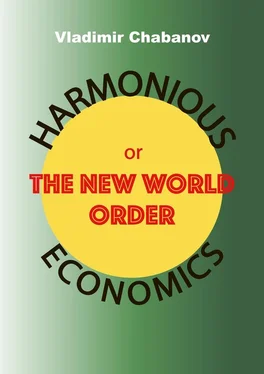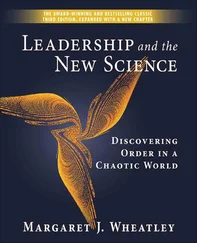To illustrate this idea, it can be mentioned that the a maiore ad minus 15 15 [ Translator’s note: In the original, Maori ad minus , incorrect.]
(Latin for “from the bigger to the smaller’) principle is seen in the East as the key tool for learning about the reality. All inferences are drawn from the general principles. In the West, the road towards the truth takes the opposite direction: from the simple to the more complex. Western thinkers believe that the process of learning about the world can only be consecutive, it advances as new data is collected and processed; eastern thinkers discover the world through studying and elaborating the way the general Laws of the Universe are manifested. That is why it is these laws that the western philosophers usually study.
The above explains why a western person takes a detached view of the World, striving to distance themselves from it, to acquire an absolute personal freedom, and an Indian, on the contrary, tries to merge with the World. Therefore, a western person draws conclusions regarding their inner world based on external sensations, while an Indian person is guided by their internal meditations.
Consequently, western mind has a wide knowledge of the Nature, and knows very little about it essence. Europeans always try to make use of things instead of understanding them. They see the reality as something that works, that is connected with the world of phenomena, while for an Indian only the soul, the spirit is real.
Science, with its tendency for systematisation, for logic and consistency, is undoubtedly an invention of the western world. Science conforms with its capacity for logical thinking and reality management. However, about 80% of the scientific knowledge considered evident is proved wrong every 100 years. Although the physical world view as presented by modern science is logically rigorous and justified, it allows no space for life. So, this theory will suffer no changes if the humans disappear from the Universe. Now what is the real value of science if the only being it was created for is excluded from its structure?
The East, on the contrary, glorifies the rational dominant of feeling, elevates the spiritual component of the World, and perceives the truth through intuition, feelings and emotions. That is why eastern knowledge is indifferent to time running, and what was valued a thousand years ago is still valued today. To give just one example, “ The supreme good of the human-beast is health; the supreme good of a spiritual human being is truth ’ 16 16 [ Translator’s note: Translated by me.]
(from The Gems of the East [15]). Is there anything to oppose this statement? Indeed, what is eternal is immune to change, and what is constant is eternal.
All this eventually shaped the different views of the people who live at the opposite points of the planet, both their views of themselves, and of the World around them. One of the cultures under consideration underestimates the world of consciousness, the other rejects that of the Uniform Spirit. The West celebrates “objectiveness’ sacrificing to it the beauty and the integrity of life. The East substitutes objectiveness with wisdom, peace of estrangement and psychic immobility that help human beings return to the source and leave all troubles and joys outside . “Subjectivity is really an advanced or preparatory stage for objectivity ’ (Satprem [18]).
Having completed their historic development, the Europeans have gone so far from their origins that their minds have finally split into faith and knowledge. This is not surprising, as any psychological exaggeration leads to a split into the inherent opposites. Thus, a European person, equipped with the bad habit of believing and, at the same time, with a developed scientific and philosophic criticism, is inevitably trapped either in blind adoration or in an equally uncompromising rejection of foreign opinions and lifestyles.
The East believes that “ Everything requires for its existence its own opposite, or else it fades into nothingness ’ (Carl Gustav Jung, [17]). The World is stable as long as its composing factors are balanced. It understands that “ Where there is faith, there is doubt; where there is doubt, there is thirst for faith; where there is morality, there is temptation ’ (Laozi). That is why “ The West can galvanize and separate, but it can neither stabilize nor unite ’ (A. J. Toynbee).
An Indian take care both of the body and the mind, and a European keeps forgetting to attend to either the one or to the other. Where there is a will, there is a way, claims the West, and a European person takes this as a life motto. Thanks to persistent energy and forgetfulness, the Europeans have conquered the entire planet. And, at the same time, they have lost their planet. “ That is the sickness of western man, and he will not rest until he has infected the whole world with his own greedy restlessness ’ (C. G. Jung [17]). This is why the western man has become a symbol of the material component of the World , this is why he has made impressive material achievements. However, he has failed in the spiritual ones, as an increase in one place will always be balanced by a decrease in another, according to the law of conservation of energy.
In fact, neither of these two highly contrasted viewpoints is universal. As the great medieval scientist, theologian and poet Jalāl ad-Dīn Muhammad Rūmī [19]said, there are two tools for discovering the world: logic and sense. And these two are inseparable and irreplaceable, just as the two sides of the coin. Rumi believed that the more one tries to push apart two opposites, the more power they have.
Obviously, a person’s mood and their understanding of the good and the evil, the moral and the immoral is profoundly influenced by the religious dogmas that the person lives by. It is evident that people with different psychic and incomparable values cannot pray to the same god. And for a Christian, notwithstanding his confession, the structure of the religion, i.e. the difference of its rituals from other religions, is more important than their sense. A Christian transposes these rituals onto himself and, as the result, feels the competition between the religions, but cannot imagine their union.
For an Indian, on the contrary, the apparent differences of the religions are of little consequence, as he instinctively tries to discard the superficial to glorify the common features of all religions. An Indian would rather give up dogmas than circumscribe the essence of God, making God universal through limitation. “ One, He presides over all wombs and natures; Himself the womb of all ’ 17 17 Cit. ex Gh. Aurobindo, Sri Aurobindo: The Hour of God: Selections from His Writings (Sahitya Akademi, 1995), 10.
establishes Shvetashvatara Upanishad (V.5). According to the eastern philosophy, God and man are linked by indissoluble ties: “ In whatever way people surrender unto me, I reciprocate with them accordingly. Everyone follows my path ’ 18 18 Cit. ex S, Mukundananda, Bhagavad Gita: The Song of God (Jagadguru Kripaluji Yog, 2013).
, reads Bhagavad Gita (IV,11 [15]).
Western religious practice is based on prayer, on the worship and the adoration of God. A person from the East mostly communicates with the Deity by being immersed in unconsciousness that they believe to be the supreme conscience. A European echoes Saint Paul, “ I am crucified with Christ: nevertheless I live; yet not I, but Christ liveth in me ’ (Gal.2:20). And the Indian surah promises “ And you shall know that you are Buddha ’ (Taittirīya Upanishad X). This is the reason why the spiritual approach of the East stupefies western man, and vice versa. A good Christian cannot save himself, just as a Buddha cannot worship a God other than himself. And even though the western civilisation is not as blessed as it seems, it is also incapable of accepting the spiritual approach of the East. And similarly, the East cannot cast away its culture to adopt another one, raised from foreign ground.
Читать дальше












